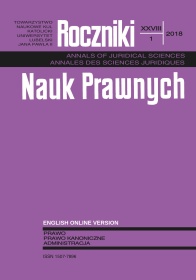Amicable Methods for Collective Dispute Resolution—Selected Legal Issues
Abstract
The article deals with the issue of asserting the rights and interests of all employees who enjoy the representation of trade union organisations in their disputes with the employer. The aim of the article is to give a detailed presentation of issues related to collective labour disputes.
To achieve this aim, the stages at which the rights and interests underlying collective labour disputes are presented in detail. This study employs the dogmatic-legal method. The author carries out an analysis and interpretation of the provisions relating to collective labour disputes in the field of labour law. It was vital to examine the legal norms established by the legislator. A description and systematisation of the applicable legislation was also conducted. Issues relating to the resolution of collective disputes in the workplace are presented theoretically with a detailed discussion of the specific stages.
This presented work is divided into four parts. The first presents the basic notions related to collective labour disputes. The sections that follow present the problems involved in the particular stages of claims enforcement based on employment relationship, i.e. bargaining, mediation, and arbitration. The rules for joining specific stages of resolving the above mentioned disputes were also discussed.
To a large extent, the issues elucidated here bring the reader, and above all entities involved in collective labour conflicts, closer to the methods of asserting their own rights and interests.
References
Baran, Krzysztof W. “Spór indywidualny a spór zbiorowy w prawie pracy.” In Zbiorowe prawo pracy w społecznej gospodarce rynkowej, edited by Grzegorz Goździewicz. Toruń: Towarzystwo Naukowe Organizacji i Kierownictwa „Dom Organizatora”, 2000.
Cudowski, Bogusław. “Model rozwiązywania sporów zbiorowych.” In Zbiorowe prawo pracy w społecznej gospodarce rynkowej, edited by Grzegorz Goździewicz. Toruń: Towarzystwo Naukowe Organizacji i Kierownictwa „Dom Organizatora”, 2000.
Hajn, Zbigniew. “Pracodawca i organizacja pracodawców jako podmioty zbiorowego prawa pracy.” In Zbiorowe prawo pracy w społecznej gospodarce rynkowej, edited by Grzegorz Goździewicz, 137–60. Toruń: Towarzystwo Naukowe Organizacji i Kierownictwa „Dom Organizatora”, 2000.
Kalisz, Anna, and Adam Zienkiewicz. Polubowne rozwiązywanie konfliktów w pomocy społecznej. Sosnowiec: Wyższa Szkoła Humanitas, 2015.
Rycak, Artur. “Praktyka arbitrażu społecznego w zbiorowych sporach pracy w Polsce.” In Arbitraż i mediacja w prawie pracy, edited by Grzegorz Goździewicz, 45. Lublin: Wydawnictwo KUL, 2005.
Seweryński, Michał. “Wybrane zagadnienia rozwiązywania sporów zbiorowych w Polsce.” In Arbitraż i mediacja w prawie pracy, edited by Grzegorz Goździewicz, 45. Lublin: Wydawnictwo KUL, 2005.
Skałkowski, Marek. “Przepisy ogólne.” In Kodeks pracy 2017. Praktyczny komentarz z przykładami, edited by Marek Skałkowski, 13–20. Warsaw: Infor, 2017.
Szlęzak, Andrzej, and Roch Pałubicki. “Pozasądowe sposoby rozwiązywania sporów pracowniczych. Uwagi ogólne. “ In Pozasądowe sposoby rozwiązywania sporów pracowniczych, edited by Agnieszka Góra-Błaszczykowska and Katarzyna Antolak-Szymanski, 21–32. Warsaw: Dom Wydawniczy Elipsa, 2015.
Wronikowska, Ewa, and Paweł Nowik. Zbiorowe prawo pracy. Warsaw: Wydawnictwo C.H. Beck, 2008.
Wratny, Jerzy, and Krzysztof Walczak, ed. Zbiorowe prawo pracy. Komentarz. Warszawa: Wydawnictwo C.H. Beck, 2009.
Copyright (c) 2018 Roczniki Nauk Prawnych

This work is licensed under a Creative Commons Attribution-NonCommercial-NoDerivatives 4.0 International License.


